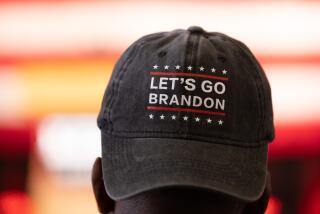Daum: We’re weary of ‘being Trayvon’
- Share via
In the wake of the media blackout imposed last week by Angela Corey, the newly appointed special prosecutor investigating February’s fatal shooting of black Florida teen Trayvon Martin, the media has had no choice but to cover the story surrounding the story. This would include the widespread public demonstrations, the evolution of the “hoodie” as a symbolic rallying point, and the emergence of protest T-shirts adorned with phrases like “I Am Trayvon” and “Justice for Trayvon,” both of which Martin’s mother is trying to have trademarked.
The short bursts of indignation haven’t been limited to writing on shirts. Social media sites have been burbling with support for Martin, who was unarmed when he was killed by George Zimmerman, a white neighborhood watch volunteer who apparently saw him as a threat. On Facebook, where a “Justice for Trayvon Martin” page currently has more than 200,000 “likes,” users have shown solidarity by posting photos of themselves in hoodies.
Meanwhile, some celebrity tweeters got in trouble last week when they used their 140 characters to broadcast Zimmerman’s home address. As it turned out, director Spike Lee got the address wrong, driving the parents of one (unrelated) William George Zimmerman out of their home. Roseanne Barr retweeted the correct address and phone number, later deleting it but adding that if Zimmerman wasn’t arrested she’d retweet again and “maybe even go 2 his house myself.” This tidbit first appeared on the Smoking Gun and then spread across the Internet until it landed on enough news sites to pass for important information.
So this is what a media blackout looks like: gossip reframed as news, T-shirt slogans as portents of revolution, Twitter as public records database. In other words, a lot of wheels spinning.
But now that the Florida state attorney’s office has finally stopped spinning its wheels and started investigating the case, it might be a good idea to give the tweeting and the T-shirts and the hoodie meme a rest.
Some of the reasons are too obvious to ignore. Protesting a vigilante act by making vigilante-like threats on Twitter is about as hypocritical as it gets. Other reasons are obvious but will inevitably be ignored anyway: Whenever there’s a massive groundswell around a cause, particularly if it’s been inflamed by the Internet and even more particularly if it touches on a sensitive issue like race, the shouting and sloganeering tend to drown out the facts (some of which are still murky in this case and some of which suggest that Zimmerman, while perhaps a reactionary, is not necessarily the racist many have made him out to be).
But perhaps the best reason for turning Trayvon-related animus down a notch or two — at least for the time being — is the prevention of the latest media-generated scourge: Indignation Fatigue.
We’ve been employing so much indignation lately, how can we be anything but exhausted? We’re indignant at our political leaders, our justice system, our radio talk show hosts. Last month, a viral video about Ugandan warlord Joseph Kony made us indignant about human rights abuses in Africa until some of us changed our minds and became indignant about the motives of the Americans who made the video, one of whom apparently got so stressed that he was caught on video suffering a breakdown and running around naked in public. The indignation turned to shock and then amusement, and then everyone forgot about it.
In the days before current events were rebranded as “trending topics,” public indignation arrived slower and stayed longer. It took the form of picketing and passing out fliers. It sometimes involved police barricades. It almost always involved showing up. Today, with dissent just a click away, indignation has a shelf life that’s all but over when the next object of outrage comes along.
Those who are making the most noise — virtual and otherwise — about the tragedy of Martin’s death are doing so because they fear, understandably, that a shoddy investigation and the ramifications of “Stand your ground” laws threaten to compound that tragedy. But they have more to fear than that: the potential for all that noise to dull the senses and shorten the memory.
After all, “I am Trayvon” may get trademarked. But “I don’t care anymore” is public domain.
More to Read
A cure for the common opinion
Get thought-provoking perspectives with our weekly newsletter.
You may occasionally receive promotional content from the Los Angeles Times.











